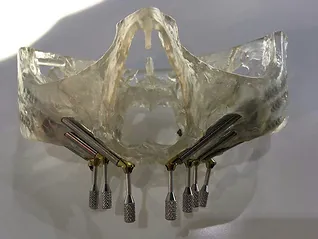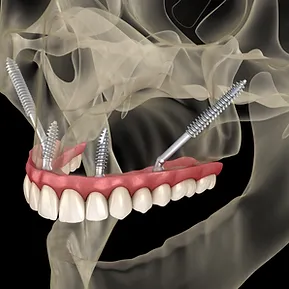Others said "not enough bone", we say "meet zygomatic implants"
Zygomatic implants offer an innovative alternative to conventional dental implants for individuals dealing with significant bone loss in the upper jaw. Unlike regular implants that penetrate and are absorbed by the upper jawbone over time, zygomatic implants are anchored and attached to the cheekbone (zygomatic bone). This bone is wider and more resistant to absorption, providing a stable and reliable foundation for permanent dental restorations in cases of extensive bone loss in the upper jaw.
If you are dealing with significant bone loss in the upper jaw, zygomatic implants can be a viable option to regain permanent teeth that will allow you to smile, chew, and regain full oral function. This is a complex surgical procedure with potential risks, so choosing an experienced oral and maxillofacial surgeon is crucial. With over 23 years of experience and expertise in oral and maxillofacial surgery, Dr. Blal can help you undergo this complex procedure safely and efficiently, without unnecessary risks or complications.


Choosing the right professional for zygomatic implant procedures is crucial. Explore why an oral maxillofacial surgeon is your best choice for this intricate procedure.
Oral maxillofacial surgeons undergo a rigorous 5-year residency, gaining unique expertise in the complex anatomy of the oral cavity, cheekbone, and upper jaw, making them ideal for implant procedures.
These implants carry specific risks, including potential complications related to the sinuses and eyes. Only an oral maxillofacial surgeon has the specialized training to mitigate these risks effectively.
Oral maxillofacial surgeons use computer-assisted planning and surgical guidance jigs, maximizing precision and minimizing risks during zygomatic implant placement.
From initial evaluation to post-operative recovery, trust an oral maxillofacial surgeon for a comprehensive, 360-degree approach to your zygomatic implant needs.
Zygomatic implant procedures require specialized skills, especially in patients with significant bone loss in the upper jaw. An oral maxillofacial surgeon is uniquely equipped to handle these complex cases.
In the rare event that complications arise, an oral maxillofacial surgeon has the specialized training to manage and resolve issues effectively, ensuring patient safety and optimal results.
